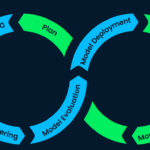Welcome to the time of Cloud-Powered DevOps, a game-changing cooperative energy that is revolutionizing how associations create and work with programming. In this digital age, where cloud technologies are reshaping scenes, DevOps takes center stage in the cloud, pushing development and effectiveness higher than ever. Go along with us on an exciting journey to investigate the unique combination of Cloud and DevOps, unwinding how this strong partnership is smoothing out improvements and task processes in the consistently extensive cloud environment.
The world’s leading cloud suppliers, like AWS, Azure and Google, provide various ‘DevOps as a Service’ contributions. Every one of them gives a start-to-finish climate for DevOps groups, empowering them to wipe out the need to download, learn, and incorporate numerous point arrangements. The famous tools now widely being used are:
- AWS DevOps Tools: AWS CodePipeline, AWS CodeBuild, AWS CodeDeploy, AWS CodeStar, and AWS CodeCommit
- Azure DevOps Tools: Azure Pipelines, Azure Boards, Azure Repos, Azure Test Plans, Azure Artifacts.
- Google DevOps Tools: Google Cloud Build, Google Cloud Deploy, Google Artifact Registry, and Google Cloud Monitoring
DevOps services Company India let’s dive into the core principles and advantages of Cloud-Powered DevOps, where the cloud catalyzes a seamless agile software delivery experience.
The Essence of Cloud-Powered DevOps
Cloud-powered DevOps is an evolution that applies DevOps principles to the cloud computing environment. It uses cloud platforms’ scalability and adaptability to improve collaboration, automate procedures, and accelerate software delivery by seamlessly integrating development and operations. The cloud turns into the establishment for a more light, responsive, and proficient DevOps workflow.
Key Features of Cloud-Powered DevOps
Scalability and Adaptability: Cloud environments give the versatility expected to proficiently adjust to differing responsibilities and the adaptability to allot assets. This guarantees that development and operations groups can scale their exercises consistently.
Automation in the Cloud: Utilizing cloud services takes into consideration broad automation, testing, arrangement, and monitoring cycles. Automation reduces manual work, lessens human error, and speeds up the delivery of software services.
Collaboration across Cloud Services: Cloud-powered DevOps encourages cooperation across different cloud services. Cross-functional cooperation and communication are enhanced by development teams’ seamless integration with a variety of cloud services and tools.
Improved Safety efforts: Cloud suppliers put vigorous in safety efforts. Cloud-powered DevOps uses these security highlights, guaranteeing that applications and data are protected all through the improvement lifecycle.
How do DevOps and the Cloud cooperate?
A portion of the ways by which DevOps and Cloud cooperate are:
Cloud is utilized by DevOps:
Associations using DevOps oversee and automate their foundation utilizing Cloud computing technologies. This empowers them to follow a light-footed way to deal with various work processes. DevOps processes are supposed to be exceptionally agile when carried out productively, however, they can face the limitations of an on-premise climate from time to time.
DevOps teams may experience unnecessary delays and complexity as a result of an organization’s need to start building a new software project or scale up an existing production application.
DevOps can greatly benefit from Cloud infrastructure in situations like these. Through a single platform for deploying, testing, integrating, and releasing applications, it makes it possible to have centralized management and reduce latency. They likewise offer CI/Disc instruments to robotize DevOps processes. This empowers the DevOps groups to team up with one another across dispersed endeavor conditions alongside adjusting to the evolving prerequisites.
It is frequently stated that cloud-based DevOps services Company India are more cost-effective than on-premise automation solutions. They work with the administration by bringing together the various conditions and lessening the security trouble in groups. This general cloud-based DevOps mechanization limits human mistakes and smooths out repeatable cycles and undertakings.
CloudSecOps (Cloud Security Activities):
SecOps is a coordinated effort between IT security and IT activities. It incorporates cycles, devices and innovation to keep a venture secure alongside lessening any related dangers. Cloud security activities, or CloudSecOps, is a development of SecOps that expects to distinguish, answer, and recuperate frameworks from assaults focusing on an association’s cloud resources.
There are multiple roles in CloudSecOps teams. Some of them are:
Incident Management: recognizes security incidents, answers them, and directs the reaction with lawful and correspondence groups.
Event Prioritization: Focusing on occasions given chance score estimation for cloud frameworks, records, and gadgets, and distinguishing cloud information responsiveness.
Threat detection: Finding progressed security dangers with the assistance of instruments that channel out the commotion from security observing arrangements empowering progressed examination of information.
DevOps as a Service:
DevOps as a Service is a bunch of cloud-based instruments that empower cooperation between the turn of events and task groups of an association. This toolset covers all the important DevOps processes and gives them a bound-together stage where the groups select the instruments they need for each reason.
DevOps as a Service platform empowers associations to set up consistent integration / Continuous Delivery (CI/CD) pipelines using the cloud to increment improvement speed and give constant input to the engineers. This way the group can get to any pertinent innovation without finding, embracing, and gaining proficiency with numerous devices.
How Cloud DevOps Streamline Software Delivery?
Continuous Integration (CI): Developers regularly merge their code changes into a centralized repository, which is promoted by DevOps. This cycle permits automated assembly and testing to distinguish gives right off the bat in the advancement cycle.
Continuous Delivery (CD): CD makes CI a stride further, automating the entire delivery process. It improves the efficiency of the software delivery pipeline by ensuring that code changes are automatically tested and ready for deployment.
Automation: DevOps intensely depends on mechanization to smooth out redundant undertakings, decrease manual blunders, and speed up the turn of events and organization processes. Important components include automated testing, deployment, and monitoring.
Azure DevOps: An Exhaustive DevOps Platform
Azure DevOps is a set of development tools and services given by Microsoft that uphold the standards of DevOps practices. It incorporates administrations for version control and build automation, and that’s only the tip of the iceberg. Azure DevOps improves coordinated effort, mechanizes the product conveyance lifecycle, and gives significant experiences in the advancement cycle.
Software for DevOps: A Catalyst for Development
DevOps programming includes a scope of instruments that work with joint effort, mechanization, and observation. Models incorporate Jenkins for constant coordination, Docker for containerization, Ansible for managing configuration and Kubernetes for organization. These instruments work together to establish a consistent DevOps climate.
Top DevOps Service Companies in India
India has arisen as a center for DevOps services company India, with a few organizations driving how to give cutting-edge solutions. A few striking names include:
- Tata Consultancy Services (TCS): TCS offers an exhaustive DevOps suite, giving central roles for continuous integration, delivery and automation..
- Wipro: Wipro’s DevOps arrangements underline nimbleness, joint effort, and end-to- end automation for quicker programming conveyance.
- Infosys: Infosys offers DevOps services that cover the entire software development lifecycle and guarantee quality and efficiency throughout.
- HCL Technologies: HCL Technologies offers a scope of DevOps services, encompassing preparation, development, testing, sending, and checking.
- Tech Mahindra: Tech Mahindra works in DevOps change, assisting associations with embracing agile approaches and accomplishing consistent delivery.
- Cognizant: Cognizant improves software development speed and quality by seamlessly integrating Agile and DevOps practices.
The organization embraces a client-driven approach, fitting DevOps answers for meet explicit business goals and difficulties.
- Mindtree: Mindtree gives DevOps counselling services, directing associations through the reception and improvement of DevOps rehearses.
Mindtree places an emphasis on continuous improvement, ensuring that DevOps procedures adapt to shifting business requirements.
- Persistent Systems: DevOps platforms and solutions are created by Persistent Systems to facilitate software development collaboration, automation, and efficiency.
The organization puts areas of strength into development, assisting clients with remaining at the front line of innovative progressions through DevOps rehearses.
These organizations stand as models in the Indian DevOps environment, offering a range of services that engage associations to explore the intricacies of present-day programming improvement and tasks.
How Does Cloud DevOps Work; Step-by-Step Lifecycle
Planning: Plan the development and deployment process, establish priorities, and define project goals.
Coding: Developers compose and blend code changes into the store, guaranteeing ceaseless incorporation.
Building: Automated tools construct the application, and persistent integration tests guarantee code quality.
Testing: During the early stages of the development process, issues are discovered and resolved by automated testing, which includes unit tests and integration tests.
Deployment: The application is sent to the staging environment for additional testing before moving to creation.
Monitoring: Nonstop observing the application helps to identify and address any exhibition or dependability issues.
Feedback: To gather insights, evaluate performance, and make enhancements for the upcoming development cycle, feedback loops are established.
Conclusion:
All in all, Cloud-Powered DevOps is a groundbreaking tool to deal with software development, upgrading coordinated efforts, automating processes, and conveying great programming at speed. With the ascent of distributed computing and stages like Azure DevOps, DevOps is turning into a foundation for associations making progress toward development and effectiveness in their software delivery pipelines.



